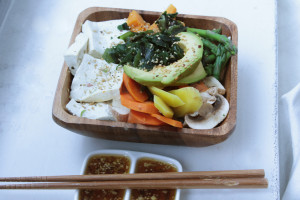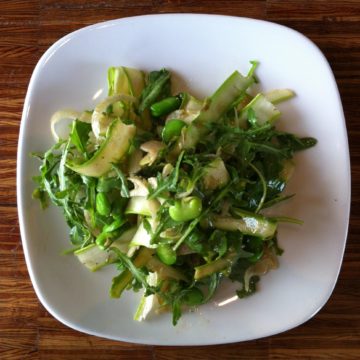I’d long heard about the virtues of anti-inflammatory foods and even bought a few expensive potions from Origins without knowing exactly what I was battling. Then just a few weeks ago I started feeling it firsthand: the all-over body aches when I was not getting enough sleep for days at a time, and an angry, constantly-stinging patch of skin on my upper back that feels eerily like carpet burn. For a normally healthy duck like me, these inflammatory attacks were a revelation. Inflammation is your body’s natural response to infection or injury, like how a cut swells and reddens before healing. It’s a perfectly necessary step toward recovery when it’s called for–but chronic inflammation is a risk factor for Type 2 diabetes, heart disease, aging, and cancers, among others. In fact, there’s mounting evidence that inflammation is linked to almost every possible ailment out there–even depression. So take these steps to reduce inflammation for a healthier mind and body!
1. DO Get enough sleep–according to a study by Emory University researchers, people who have less than 6 hours of sleep had increase in three inflammatory hormones including a whopping 25% increase in C-reactive protein. Researchers concluded that inflammation caused by sleep-deprivation can contribute to higher risk for heart disease and stroke!
2. DO Eat sour cherries–In 2012, researchers at the Oregon Health and Science University suggested that “tart cherries have the highest anti-inflammatory content of any food,” and more results have been collected since then to back up the claim. Tart cherry juice has been shown to reduce muscle pain and inflammation from long-distance running–vegan athletes, take note!
3. DON’T stress out–Yet another proof that the body is a complex organism affected by your mind and emotion as much as more physical factors: researchers at Ohio University found out that just mulling over a recent stressful event raised C-reactive protein levels for around one hour after the event. So if it’s not something that you can change, just let it go! Cuddle with your pet, read a good book, or go for a run. Your body will thank you.
4. DO breathe better–You already know that smoking (yourself or secondhand) is really bad for you. But the air you breathe has consequences on your body even if you don’t inhale any cigarette smoke. In the developing world, indoor air pollution is a huge problem that causes chronic inflammation and even acute respiratory symptoms leading to death. Open stove, cooking smoke, and even incense can contribute to respiratory inflammation. If you live in a highly polluted area, invest in an air purifier.
5. DON’T eat inflammatory foods–gluten, sugar, and alcohol are major inflammatory agents, which partly explains why your body doesn’t feel so great after eating these.
 6. DO stock up on veggies and fruits–according to Dr. Andrew Weil, (who was among the first people to call attention to inflammation) vegetables and fruits should make the bottom of your anti-inflammatory food pyramid, not grains, breads, and pasta. The pyramid does include fish so it’s more pescatarian, but it’s otherwise remarkably close to an ideal vegan diet.
6. DO stock up on veggies and fruits–according to Dr. Andrew Weil, (who was among the first people to call attention to inflammation) vegetables and fruits should make the bottom of your anti-inflammatory food pyramid, not grains, breads, and pasta. The pyramid does include fish so it’s more pescatarian, but it’s otherwise remarkably close to an ideal vegan diet.
7. DO work out regularly–lack of exercise is one of the major causes of inflammation, right? But I never put anything on PD that I don’t fact check–and indeed, here’s the scientific proof of what we already know in the bottom of our hearts.
8. DO take algae supplements–According to a recent study, DHA (an Omega-3 fatty acid) is used by your white blood cells to turn on and off the “switch” that controls inflammation. As most of you know already, DHA is found in large quantities in fish oil, but vegans can get their fill through algae! You can add algae to your green juice at your local natural market–or buy it in supplement form. Remember to stock up on other Omega-3 rich foods like walnuts and flax seeds.
 9. DO lose weight–excess weight can be a significant inflammatory factor, since fat cells secrete inflammatory agents even when such a response is not needed. According to scientists at Johns Hopkins, overweight or obese patients showed reduced inflammation levels when they lost weight through low-carb or low-fat diet (low-carb group lost more weight, but both groups enjoyed similar benefits in terms of reduced inflammation).
9. DO lose weight–excess weight can be a significant inflammatory factor, since fat cells secrete inflammatory agents even when such a response is not needed. According to scientists at Johns Hopkins, overweight or obese patients showed reduced inflammation levels when they lost weight through low-carb or low-fat diet (low-carb group lost more weight, but both groups enjoyed similar benefits in terms of reduced inflammation).
10. DO drink cocoa–a recent study showed that cocoa reduces obesity-induced inflammation and fatty liver disease. Like green tea and wine, cocoa contains a large amount of polyphenols, and is low in fat and sugar. Drinking cocoa has also been proven to improve memory and cognitive function in older people. To get the most benefits, make your own cocoa powder so you can control the amount of added sugar in your drink.
More in Holistic Health: 5 Best Hormone Balancing Food for Women
5 Flavors of Food to Balance Your Qi and Restore your Health
Photo: Peaceful Dumpling; 123rf





